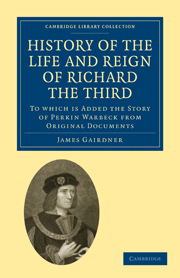 History of the Life and Reign of Richard the Third
History of the Life and Reign of Richard the Third Book contents
- Frontmatter
- PREFACE
- PREFACE TO THE FIRST EDITION
- Contents
- ILLUSTRATIONS
- CHAP. I RICHARD'S CAREER AS DUKE OF GLOUCESTER UNTIL THE DEATH OF EDWARD IV
- CHAP. II ACTS OF RICHARD AS PROTECTOR
- CHAP. III TERMINATION OF THE PROTECTORSHIP
- CHAP. IV MURDER OF THE PRINCES AND REBELLION OF THE DUKE OF BUCKINGHAM
- CHAP. V RICHARD'S GOVERNMENT, HIS PARLIAMENT AND HIS RELATIONS WITH FOREIGN POWERS
- CHAP. VI INVASION OF RICHMOND:—DEFEAT AND DEATH OF RICHARD
- THE STORY OF PERKIN WARBECK
- APPENDIX
- INDEX
- Plate section
CHAP. V - RICHARD'S GOVERNMENT, HIS PARLIAMENT AND HIS RELATIONS WITH FOREIGN POWERS
Published online by Cambridge University Press: 07 September 2010
- Frontmatter
- PREFACE
- PREFACE TO THE FIRST EDITION
- Contents
- ILLUSTRATIONS
- CHAP. I RICHARD'S CAREER AS DUKE OF GLOUCESTER UNTIL THE DEATH OF EDWARD IV
- CHAP. II ACTS OF RICHARD AS PROTECTOR
- CHAP. III TERMINATION OF THE PROTECTORSHIP
- CHAP. IV MURDER OF THE PRINCES AND REBELLION OF THE DUKE OF BUCKINGHAM
- CHAP. V RICHARD'S GOVERNMENT, HIS PARLIAMENT AND HIS RELATIONS WITH FOREIGN POWERS
- CHAP. VI INVASION OF RICHMOND:—DEFEAT AND DEATH OF RICHARD
- THE STORY OF PERKIN WARBECK
- APPENDIX
- INDEX
- Plate section
Summary
Richard returned to London at the close of November. He was met, as usual, on his approach to the city, by the mayor and aldermen with a body of horsemen clad in violet. The kingdom was now at rest and his authority undisputed. Nor can it be doubted that one so competent to rule might have reigned for a long time unmolested if he had not already lost the confidence of his people by acts of treachery and violence. But his bloodless triumph, in the opinion of his well-informed contemporary, the chronicler of Croyland, was not less expensive to him than if the two armies had come into actual conflict. With all his ability, he had not now the hearts of his subjects. Of the character of his administration we are able to form some opinion, not only from what is said of him by the chroniclers, but from the official record of his diplomatic acts from day to day; for it happens that there has been preserved to our own days a complete register of all the warrants issued by him to the Chancellor for grants, pardons, or other documents under the Great Seal, together with a large number of royal letters, instructions to ambassadors, and state papers despatched and received during the two years that he was king. Of no other king have we so minute a record; and it is not wonderful that the MS. should have been very much cited in evidence, not only as to what Richard did, but as to the motives by which he is supposed to have been governed.
- Type
- Chapter
- Information
- History of the Life and Reign of Richard the ThirdTo which is Added the Story of Perkin Warbeck from Original Documents, pp. 144 - 192Publisher: Cambridge University PressPrint publication year: 2010First published in: 1898


